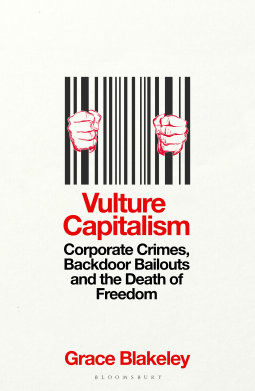
Vulture Capitalism
Corporate Crimes, Backdoor Bailouts and the Death of Freedom
by Grace Blakeley
This title was previously available on NetGalley and is now archived.
Send NetGalley books directly to your Kindle or Kindle app
1
To read on a Kindle or Kindle app, please add kindle@netgalley.com as an approved email address to receive files in your Amazon account. Click here for step-by-step instructions.
2
Also find your Kindle email address within your Amazon account, and enter it here.
Pub Date 14 Mar 2024 | Archive Date 13 Mar 2024
Talking about this book? Use #VultureCapitalism #NetGalley. More hashtag tips!
Description
Full of explosive examples and eye-opening original research, young thinker Grace Blakeley gives us a fresh look at the problems of our late stage capitalism crisis — and gives us the keys to stop it.
Everything you know about capitalism is wrong.
Free markets aren’t really free. Record corporate profits don’t trickle down to everyone else. And we aren’t empowered to make our own choices – they’re made for us every day.
In Vulture Capitalism, acclaimed journalist Grace Blakeley takes on the world’s most powerful corporations by showing how the causes of our modern crisis are the intended result of our capitalist system. It’s not broken, it’s working exactly as planned. From Amazon to Boeing, Henry Ford to Richard Nixon, Blakeley shows us exactly where late-stage capitalism has gone wrong.
Searing, explosive and timely, Vulture Capitalism is the book you need to understand what is happening in the world around you – and what you can do to change it.
Available Editions
| EDITION | Hardcover |
| ISBN | 9781526638076 |
| PRICE | £20.00 (GBP) |
| PAGES | 400 |
Available on NetGalley
Featured Reviews
I've been a fan of Grace Blakeley for a long time. I'm always incredibly grateful for any economist who can express complex ideas and issues in a coherent and engaging way. This book is no different. A comprehensive, stirring examination of the insidiousness of capitalism. It is pertinent, intelligent and essential reading for all.
 Jonty S, Reviewer
Jonty S, Reviewer
A very comprehensive look at the problems of capitalism. You may not agree with all the solutions, but the problems are all very real
This a detailed and seemingly well researched exploration into the interplay between capitalism and democracy, and the utter pervasiveness we have seen of capitalism in our economy.
It’s not the easiest read, especially if you aren’t used to reading academic texts or books in this genre, but I think there was a good attempt to try and make this accessible. I think the numerous examples and instances that were used to highlight various were both interesting in themselves but also really brought to life the points being made.
There were moments here where it felt like depth was sacrificed for breadth in terms of trying to cover too much ground. Which, I can absolutely understand as Capitalism touches so many areas of life, but it meant that at times I think there was a tendency towards sweeping statements without exploring or backing things up.
Throughout I felt that Blakeley had a really clear idea where she was going with the book and the message was clear which I think really strengthened the book and made it much easier to follow. I can also see that towards the end she very much tried to inject optimism and hope, and the importance of activism for a better future but this didn’t really hit home for me as it all felt a bit hopeless after reading about the invasiveness of capitalism for the last few hundred pages.
Thank you to NetGalley and the publisher for an E-ARC
 Philip G, Educator
Philip G, Educator
Overall, "Vulture Capitalism" offers a critical analysis of contemporary capitalism, interrogating its underlying assumptions, power structures, and socio-economic consequences. By shedding light on the negative impacts of vulture capitalism, the book contributes to broader discussions about the need for transformative change in economic and political systems to create a more just, sustainable, and inclusive society.
I read an eARC of this book so thank you to the author, publisher and NetGalley.
This book was so eye-opening and shocking. It provides examples of where companies and corporations have engaged in extremely unethical behaviour to maximise profits. This includes falsifying information, deception and manipulation which in some instances led to the deaths of hundreds of people. I was so horrified by some of these examples. This in non-fiction and the book has been carefully referenced. There’s even examples of where companies could have done things better but chose not to just because they didn’t want to let their workers have any influence.
This is an economics book and I was surprised at how quickly I read it. It’s written in such a compelling way that it really starts to make you question why things are done in certain ways. It challenges long held views about certain economic structures. I’m not surprised this book is up for awards, it’s very well-written and though-provoking.
 Reviewer 706062
Reviewer 706062
A wonderful introduction to the vagaries of capitalism. Grace Blakely provides a wealth of examples of the inextricable links between big business, governments, state institutions, and the 'free markets', all acting together in the interests of large corporations. The examples she uses cross the spectrum of economic activity from Boeing to United Fruit, Thames Water to J P Morgan., Evergrande to Ferdinand Marcos. She illustrates the growth and hegemony of neo-liberalism as the dominant economic theory in the early 1980s and explodes many of the myths of that economic witchdoctery.
However, where the book is weakest is in its analysis of the monopoly and oligopoly of tech companies and the inability (or lack of desire and even understanding) of governments to monitor their growth and ubiquity in our lives. In addition, the examples given of action against 'vulture capitalism' are not very strong. This is not Ms Blakely's fault though, there has been a shocking lack of scrutiny of and alternatives to the pandemic of capitalism in its many forms.
In fact, the myths of neo-liberalism seem to have returned with a vengeance in the United Kingdom, dominating thinking in both the Conservative and Labour parties. One Conservative chancellor makes jokes about the ':Lafler Curve' during a budget speech. While the Labour (supposed) opposition repeats the Thatcherite canard of 'maxing out the govern credit card) as if macro and micro-economic theory was equivalent to a household budget.
This book should be required reading for both front benches, Unfortunately, its honesty and detail will probably mean it will be absent from both parties Christmas stockings. A shame really. They actually might learn something.
 Sarah B, Reviewer
Sarah B, Reviewer
really interesting and fascinating book that gives an insight into what controls what (and how we all suffer in the end).
Eye opening as to the effects of capitalism and surely a call to arms overhaul our societal approaches... but inevitably those who benefit from the current systems will not change things


















